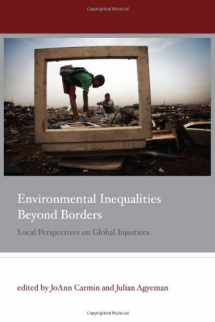
Environmental Inequalities Beyond Borders: Local Perspectives on Global Injustices (Urban and Industrial Environments)
ISBN-13:
9780262015516
ISBN-10:
026201551X
Author:
Julian Agyeman, Joann Carmin
Publication date:
2011
Publisher:
Mit Pr
Format:
Hardcover
303 pages
Category:
Specific Topics
,
Politics & Government
FREE US shipping
Book details
ISBN-13:
9780262015516
ISBN-10:
026201551X
Author:
Julian Agyeman, Joann Carmin
Publication date:
2011
Publisher:
Mit Pr
Format:
Hardcover
303 pages
Category:
Specific Topics
,
Politics & Government
Summary
Environmental Inequalities Beyond Borders: Local Perspectives on Global Injustices (Urban and Industrial Environments) (ISBN-13: 9780262015516 and ISBN-10: 026201551X), written by authors
Julian Agyeman, Joann Carmin, was published by Mit Pr in 2011.
With an overall rating of 3.8 stars, it's a notable title among other
Specific Topics
(Politics & Government) books. You can easily purchase or rent Environmental Inequalities Beyond Borders: Local Perspectives on Global Injustices (Urban and Industrial Environments) (Hardcover) from BooksRun,
along with many other new and used
Specific Topics
books
and textbooks.
And, if you're looking to sell your copy, our current buyback offer is $0.55.
Description
Multinational corporations often exploit natural resources or locate factories in poor countries far from the demand for the products and profits that result. Developed countries also routinely dump hazardous materials and produce greenhouse gas emissions that have a disproportionate impact on developing countries. This book investigates how these and other globalized practices exact high social and environmental costs as poor, local communities are forced to cope with depleted resources, pollution, health problems, and social and cultural disruption. Case studies drawn from Africa, Asia, the Pacific Rim, and Latin America critically assess how diverse types of global inequalities play out on local terrains. These range from an assessment of the pros and cons of foreign investment in Fiji to an account of the work of transnational activists combating toxic waste disposal in Mozambique. Taken together, the chapters demonstrate the spatial disconnect between global consumption and production on the one hand and local environmental quality and human rights on the other. The result is a rich perspective not only on the ways industries, governments, and consumption patterns may further entrench existing inequalities but also on how emerging networks and movements can foster institutional change and promote social equality and environmental justice.


We would LOVE it if you could help us and other readers by reviewing the book
Book review

Congratulations! We have received your book review.
{user}
{createdAt}
by {truncated_author}


